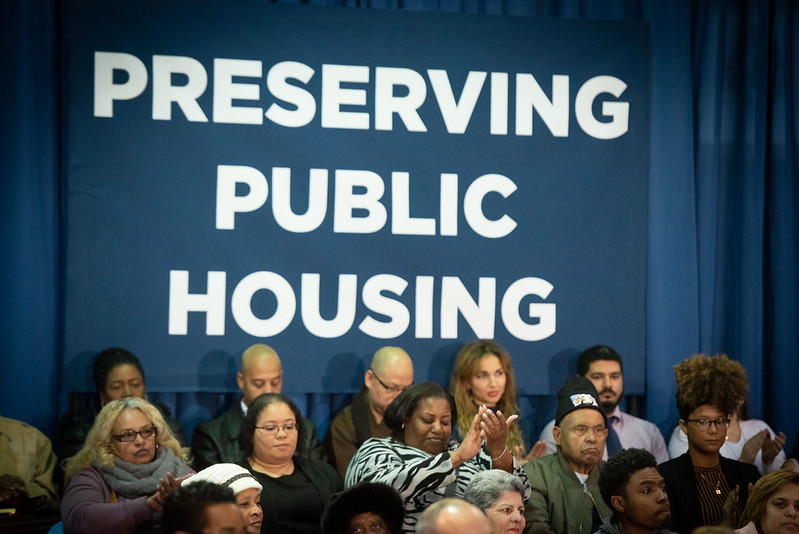
NYCHA needs to be saved (photo: Michael Appleton/Mayoral Photography Office)
The New York City Housing Authority is putting forward a promising new plan to preserve each public housing unit in its portfolio. Mayor Bill de Blasio, and previous mayors, have put forward multiple plans intended to save NYCHA, but this one bears attention and support because with sufficient community input and political support, it has a real chance of success.
For more than half-a-million renters in New York City — a city within the city — public housing has provided reliable affordability during these tumultuous times. About 1.2 million renter households in New York City have lost income due to the devastating COVID-19 pandemic and many face eviction without federal aid, but not in public housing. For public housing residents, rents are adjusted to offset lost income. This protection against income volatility is invaluable for low-income renters. And for many, it is the reason why they tolerate the frustrations of living in public housing, such as leaking pipes, heat outages, mold, and lead paint.
But New York City’s public housing, under the watch of a federal monitor, is at risk with a mounting backlog of capital repairs most recently estimated at $40 billion. To address this crisis, NYCHA is exploring an innovative new strategy to complete the preservation of its entire approximately 175,000-unit portfolio.
To date, NYCHA’s preservation plans have centered on leveraging public-private partnerships to raise revenue through PACT (NYCHA’s version of HUD’s Rental Assistance Demonstration program), as well as infill development and the sale of air rights. More than 60,000 units and $24 billion are slated to move forward under these programs but this falls far short of raising the $40 billion needed to fully address NYCHA’s rehabilitation needs. But until now, no credible plan had been put forward to preserve the remaining, approximately 110,000 units of public housing in need of repairs across the five boroughs.
NYCHA’s new strategy to create a Public Housing Preservation Trust is still at the early stages of crafting, but it provides the vision for creating a bold and comprehensive approach to financing and preservation, while keeping intact protections for residents. It cleverly uses HUD’s own disposition rules to identify a financing solution.
The plan centers on unlocking Tenant Protection Vouchers, which would be triggered through disposition, and allow higher funding levels. For the many residents and advocates who want to keep public housing in public control, they will be relieved that disposition will be made to a new publicly-controlled entity — the NYCHA Preservation Trust. This new entity will borrow against federal rent subsidies to finance repairs. It will also contract management back to NYCHA, retaining its unionized workforce, and it will have the ability to hire private sector contractors to help make repairs.
A solution for our era of climate change, it also banks on energy savings and anticipates the creation of a significant number of green jobs.
In this new strategy, there are many elements that will appeal to residents, advocates, and elected officials concerned about long-term affordability, tenant protections, and the urgency of needed repairs. And since the plan is not set in stone, there are many aspects that can be further developed to reflect their concerns and aspirations.
To succeed, however, this strategy needs broad public support. It will need endorsement from NYCHA residents, which the housing authority should seek for any major policy change. NYCHA must follow through with robust resident engagement.
The plan will also need state and federal action. The New York State Legislature, working with Governor Cuomo, will need to pass legislation to create a state-chartered public benefit corporation, similar to the School Construction Authority. The state should use this opportunity to improve oversight and also to ensure formal resident representation on the board of the new entity with decision-making power.
This new trust will be responsible for the preservation of a portion of New York City’s invaluable public housing stock, the improvement of its living conditions to meet federal standards, and its long-term affordability. The new structure will need to include reforms and improved accountability. Not all of NYCHA’s past mismanagement and compliance failures can be blamed on lack of funding and changes are necessary.
At the federal level there are two critical changes needed for this plan to work. The first is that HUD must change its policy on issuing Tenant Protection Vouchers to units only after they pass inspection for compliance with federal standards. To raise financing for needed repairs, the rental assistance must flow first. If the federal government is not going to fund repairs directly through the public housing capital fund, then they must allow NYCHA this flexibility.
Finally, Congress must significantly increase appropriations for Tenant Protection Vouchers to support this plan. This will be less costly than fully funding the public housing capital budget so it is not unrealistic to expect some bipartisan appeal to this approach.
While NYCHA has more work to do to refine this strategy and gain support over the next months, now is exactly the time when public investment in housing matters most. As a city, we must value and prioritize the preservation of our public housing. Like our public schools, public libraries, and our public parks, public housing is a critical component of our community infrastructure. NYCHA’s proposal, which complements its PACT initiative, offers a chance to preserve public housing while reimagining the public’s role in this vitally needed housing.
***
Rachel Fee is Executive Director of the New York Housing Conference. On Twitter @RachelFeeNYHC & @theNYHC.
***
Have an op-ed idea or submission for Gotham Gazette? Email This email address is being protected from spambots. You need JavaScript enabled to view it.




